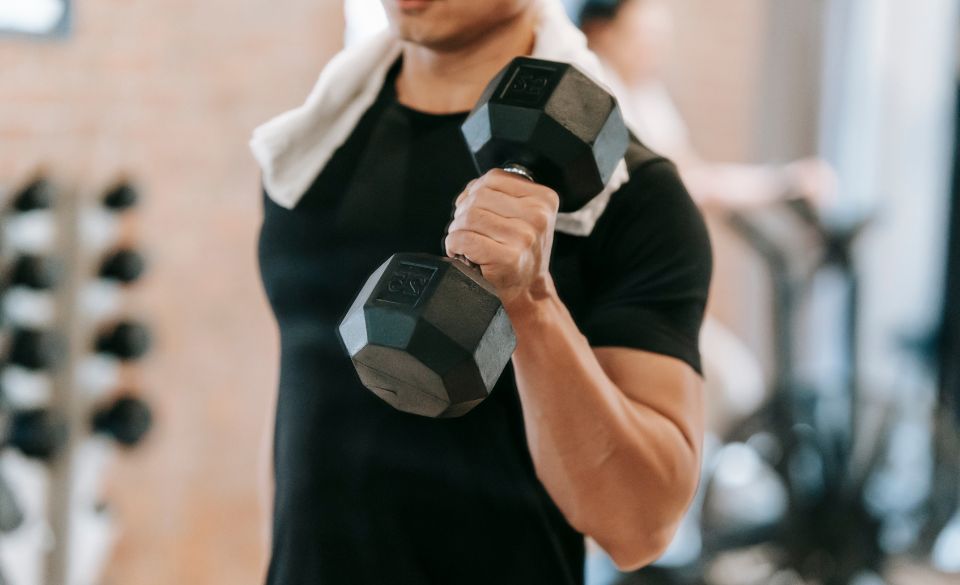
Does The Gym Increase Testosterone?
Page Contents
Exercise and gym plays a pivotal role in influencing testosterone levels, but the impact varies depending on the type of exercise you engage in and your biological sex. If you’re aiming to boost your testosterone levels, it’s essential to consider the specific exercises that can help you achieve this goal. In addition, incorporating activities known for enhancing testosterone levels into your workout regimen can be highly beneficial. This article delves into the connection between exercise and testosterone levels, highlighting the exercises that can raise testosterone levels and those that may not have the same effect. We also explore natural methods to increase your testosterone levels effectively and safely.
The relationship between exercise and testosterone (T) levels is a subject of significant interest. Different forms of exercise can indeed impact T levels, and these effects are influenced by one’s biological sex. This article provides a brief overview of how T levels function in different individuals and whether or not gym increases testosterone.
Testosterone Production
While testosterone is often regarded as the primary male sex hormone, it is present in all individuals, albeit in varying quantities. The production of testosterone occurs not only in the testicles but also in other areas, depending on an individual’s sex.
In men, the testicles are the primary site for the production of substantial amounts of testosterone. During adolescence, testosterone plays a crucial role in bringing about various physical changes, such as increased muscle mass, the growth of facial and pubic hair, and the deepening of the voice.
In women, smaller quantities of testosterone are produced in the ovaries. It is important to note that maintaining healthy T levels is essential for overall health throughout one’s life, particularly as one ages, to reduce the risk of conditions such as obesity, type 2 diabetes, and heart disease.
It is worth mentioning that transgender individuals who are undergoing hormone therapy to either suppress or increase testosterone levels may experience different effects from exercise, and research in this area is still evolving.
The Impact of Exercise on Testosterone Levels
Below is some research providing insights into how various forms of exercise affect testosterone levels:
1. A study conducted in 1983 assessed T levels in men and women after weightlifting and found that men experienced significant increases in testosterone, while women experienced minimal changes.
2. A 2001 study involving women revealed that resistance training can temporarily raise testosterone levels and influence fat distribution.
3. A 2004 study focused on older men and discovered that regular physical activity increased both testosterone and growth hormone (GH) levels, benefiting brain function.
4. A yearlong study from 2008, involving 102 men with previously low exercise activity, reported a 14.5 percent increase in dihydrotestosterone (DHT) levels.
5. In 2012, a study of men found that regular exercise was associated with higher T levels compared to sedentary individuals.
6. A 2016 study among obese men revealed that regular exercise had a more pronounced impact on T levels than weight loss.
Furthermore, maintaining healthy or elevated T levels can enhance muscle-building capabilities compared to having lower T levels.
Effective Exercises for Enhancing Testosterone Levels
It’s important to recognize that not all exercises impact testosterone (T) levels equally. Here are some of the most effective exercises known to increase testosterone:
Resistance Training
Research indicates that resistance exercises have a positive influence on both short-term and long-term T levels. Weightlifting, in particular, is a form of resistance training that stands out as a powerful method to boost testosterone, particularly in men.
A study conducted in 2007 revealed that men who engaged in strength and resistance training three days a week over a span of four weeks experienced increases in T levels immediately after each workout and over time.
However, it’s essential to note that the effects of resistance training can vary among individuals. For instance, an older study found that a single 30-minute weightlifting session led to a 21.6 percent increase in T levels in men but only a 16.7 percent increase in women. Additionally, some research suggests that the gains in T levels for women may be temporary.
Another older study observed T level increases in both young and older men after completing three sets of 8 to 10 weightlifting repetitions. However, it was found that other sex hormones, such as growth hormone (GH), were more likely to spike in younger men than in their older counterparts.
High-Intensity Interval Training (HIIT) for Men
High-Intensity Interval Training (HIIT) is another well-established method to enhance testosterone levels, but it appears to be particularly effective in men.
A study among men demonstrated that interval training, involving intense treadmill running for 90 seconds alternated with 90-second recovery periods, had a more significant impact on increasing free T levels compared to continuous running for 45 minutes.
This connection between HIIT and elevated T levels has been supported by additional studies:
A 2013 study found that combining DHEA supplements with five sessions of 2-minute cycling exercises led to increased T levels in both younger and older men.
These exercises have shown promise in boosting testosterone levels, with resistance training being a beneficial option for both men and women, while HIIT appears to have a more pronounced effect in men.
Additional Strategies for Boosting Testosterone Naturally
In addition to engaging in exercise, there are various other methods to naturally increase testosterone levels. Here are some valuable tips to consider:
1. Balanced Diet: Consume a diet rich in protein, healthy fats, and carbohydrates. Nutrient-dense foods can contribute to healthier testosterone levels.
2. Stress Management: Reducing stress and cortisol levels is essential. High-stress levels can adversely impact testosterone production.
3. Sun Exposure and Supplements: Spend time outdoors in the sunlight, or consider vitamin D supplements. Adequate vitamin D is crucial for maintaining optimal testosterone levels.
4. Vitamin Supplements: Incorporate vitamin supplements into your routine, such as zinc and vitamin B, as they can positively affect testosterone levels.
5. Quality Sleep: Ensure you get sufficient sleep each night, ideally between 7 to 10 hours. Quality sleep is fundamental for hormone regulation, including testosterone.
6. Natural Herbs: Explore the potential benefits of natural herbs like ashwagandha, horny goat weed, and ginger, which have been associated with supporting testosterone levels.
7. Chemical Avoidance (For Men): Men should be cautious about exposure to chemicals that can elevate natural estrogen levels, such as BPA. Minimizing such exposures can help maintain balanced testosterone levels.
Final Words – Does The Gym Increase Testosterone?
In summary, the relationship between exercise and testosterone (T) levels is a complex one, influenced by factors such as the type of exercise and one’s biological sex. This article has explored the impact of various exercises on T levels and highlighted that resistance training and high-intensity interval training (HIIT) can be effective in increasing T levels, particularly in men.
Furthermore, additional strategies for naturally boosting testosterone have been discussed, including maintaining a balanced diet, managing stress, getting adequate sun exposure or vitamin D supplements, considering vitamin supplements like zinc and vitamin B, prioritizing quality sleep, exploring natural herbs such as ashwagandha, horny goat weed, and ginger, and being cautious about chemical exposure for men to prevent elevations in natural estrogen levels.
Understanding how exercise and lifestyle factors affect testosterone levels can empower individuals to make informed choices to optimize their health and well-being. It is essential to consider one’s unique circumstances and consult with a healthcare professional for personalized guidance in managing testosterone levels.



